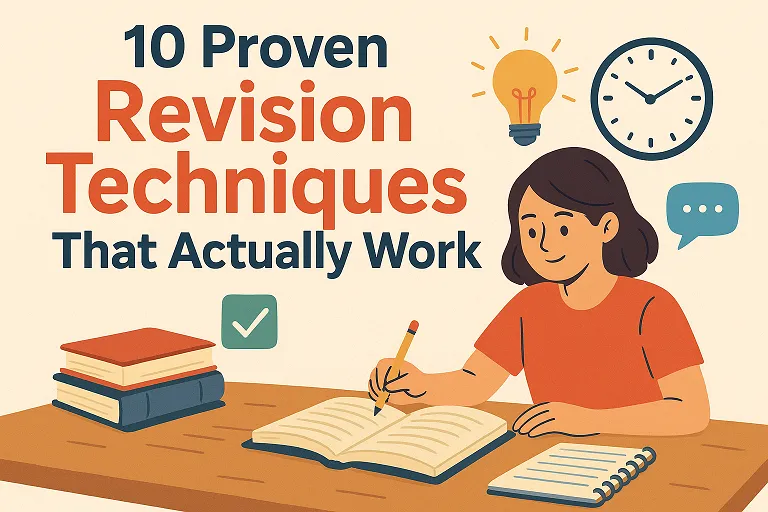How to Stay Focused While Studying at Home
Science-backed strategies to maximize concentration and productivity in your home study environment
Studying at home presents unique challenges that can test even the most disciplined students. With distractions ranging from social media notifications to household chores, maintaining focus requires intentional strategies backed by science. In this comprehensive guide, we’ll explore proven techniques to help you stay focused and productive while studying at home.
Common Home Study Challenges
15 Science-Backed Strategies for Better Focus
Designate a Dedicated Study Space
Your environment significantly impacts your ability to concentrate. Research shows that having a consistent, dedicated study space trains your brain to enter “focus mode” when you’re in that environment. This is a psychological principle known as context-dependent memory. Choose a quiet area with good lighting, comfortable seating, and minimal distractions.
Pro tip: Avoid studying in bed—your brain associates beds with sleep, making it harder to maintain alertness and focus.
Implement the Pomodoro Technique
This time management method involves studying in focused 25-minute intervals followed by 5-minute breaks. After four sessions, take a longer 15-30 minute break. This approach aligns with the brain’s natural attention span (ultradian rhythms) and prevents mental fatigue.
How to start: Use a timer app specifically designed for the Pomodoro technique to maintain consistency and track your progress.
“Students who used dedicated study spaces and structured time management techniques reported 47% higher concentration levels and 52% greater information retention.” – Journal of Educational Psychology
Digital Distraction Management
The average student checks their phone every 8-10 minutes while studying. According to research from the University of California, Irvine, it takes an average of 23 minutes and 15 seconds to get back on task after an interruption. This creates a significant cognitive load as the brain constantly switches tasks.
Action steps: Use website blockers like Freedom or Cold Turkey during study sessions, enable “Do Not Disturb” mode, and keep your phone in another room. Studies show this can recover up to 2.5 hours of productive study time daily.
Create a Structured Study Schedule
Without the structure of a physical classroom, creating your own schedule is essential. Our brains thrive on routine, and having a predetermined study schedule reduces the mental energy spent on deciding when and what to study.
Implementation: Plan your study sessions at the same time each day, and detail which subjects you’ll cover. Share your schedule with family members to minimize interruptions. This also helps establish a clear boundary between ‘study time’ and ‘free time’.
Optimize Your Environment
Environmental factors significantly impact concentration. Research indicates that room temperature between 68-72°F (20-22°C), proper lighting (around 500 lux, similar to daylight), and minimal noise optimize cognitive performance.
Quick fixes: Use a desk lamp for task lighting, maintain a comfortable room temperature, and consider noise-cancelling headphones or white noise if your environment is noisy. Even adding a plant to your desk can improve concentration by up to 15%, according to a study by the University of Exeter.
Stay Hydrated and Nourish Your Brain
Your brain is about 75% water. Even mild dehydration can shrink brain tissue, impairing concentration, memory, and reaction time. A study from the University of East London found that drinking water can boost cognitive performance by as much as 14%.
Smart choices: Keep a water bottle on your desk at all times. Fuel your brain with foods rich in omega-3s (like walnuts and fish), antioxidants (blueberries), and complex carbohydrates (oatmeal) to sustain energy levels.
Prioritize a Full Night’s Sleep
Sleep is not a luxury; it’s a biological necessity for learning. During sleep, your brain consolidates memories, transferring information from short-term to long-term storage. The American Academy of Sleep Medicine recommends 8-10 hours for teenagers.
Impact of deficiency: Getting less than 7 hours of sleep can impair the function of your prefrontal cortex, the brain region responsible for attention, planning, and self-control, by up to 50% the next day.
Embrace Active Recall
Passive learning, like re-reading notes or highlighting, creates an illusion of competence. Active recall, the process of actively retrieving information from memory, is far more effective. Each time you retrieve a memory, you strengthen its neural pathway.
Practical application: Instead of re-reading, close your book and summarize the key concepts. Use flashcards, try to answer practice questions without looking at the solution, or explain the topic to an imaginary student. Research shows this can increase long-term retention by over 50%.
Integrate Short Bursts of Exercise
Physical activity isn’t just for your body. Exercise increases blood flow to the brain and triggers the release of Brain-Derived Neurotrophic Factor (BDNF), a protein that supports the growth of new neurons and is vital for learning and memory.
Actionable break: You don’t need a full workout. A study from the University of Illinois found that a brisk 20-minute walk can significantly improve attention and cognitive control for up to three hours afterward. Use your study breaks for a walk, stretching, or a few jumping jacks.
Use Sound to Your Advantage
Silence isn’t always golden. For some, ambient noise can enhance focus. A study in the *Journal of Consumer Research* found that a moderate level of ambient noise (around 70 decibels, like a coffee shop) can boost creativity and concentration.
Find your sound: Experiment with what works for you. This could be white noise apps, instrumental music (classical or electronic), or nature sounds. Avoid music with lyrics, as it can engage the language centers of your brain and become a distraction.
Master Your Mindset
Set Specific, Micro-Goals
Vague goals like “study biology” are overwhelming and invite procrastination. Instead, break down large tasks into small, specific, and achievable micro-goals. Completing these small tasks provides a sense of accomplishment and triggers a small release of dopamine, the brain’s “motivation” chemical.
Example: Instead of “Revise Chapter 5,” set goals like “1. Read pages 50-55,” “2. Summarize the section on mitosis,” and “3. Complete 5 practice problems.”
Practice Mindfulness
Focus is a mental muscle. Mindfulness meditation is a workout for this muscle. Research from INSEAD and the Wharton School has shown that even a few minutes of daily mindfulness can improve attention, concentration, and emotional regulation.
Simple start: Before beginning a study session, take 5 minutes to sit quietly and focus on your breath. When your mind wanders (which it will), gently guide your attention back to your breath. This simple act trains your brain to control its focus.
Leverage Natural Light
Exposure to natural light helps regulate your body’s internal clock, or circadian rhythm, which controls your sleep-wake cycle and alertness levels. A study by Cornell University found that workers in daylight-optimized offices reported an 84% drop in issues like eye strain, headaches, and blurred vision.
Bright idea: Position your study desk near a window whenever possible. If you’re studying in the evening, use “daylight” spectrum light bulbs ($~6500K$) to mimic natural light and maintain alertness.
Apply the “Two-Minute Rule”
The hardest part of studying is often just getting started. The “Two-Minute Rule,” popularized by author James Clear, is designed to overcome this initial inertia. The rule states: when you start a new habit, it should take less than two minutes to do.
How it works: “Read IGCSE Physics” becomes “Open my physics textbook.” “Write essay” becomes “Write one sentence.” The goal is not to finish the task, but simply to start. Once you begin, momentum often carries you forward.
Review and Reward Your Efforts
Your brain is wired to repeat actions that lead to rewards. By consciously rewarding yourself for completing a study session, you create a positive feedback loop that makes it easier to stay consistent in the long run. This is a core principle of behavioral psychology.
Effective rewards: The reward should be immediate and proportional to the effort. After a 25-minute Pomodoro session, your reward might be listening to one song. After completing all your study goals for the day, it could be watching an episode of your favorite show.


